Additional solar power projects exceed the planning by more than 10 times, many of which were "unauthorized", leading to an imbalance between source and grid, according to the Government Inspectorate.
On December 25, the Government Inspectorate announced the conclusion of the inspection of management and investment in construction of power projects according to the Power Plan VII and the revised Power Plan VII. The results pointed out many shortcomings and violations in approving the addition of solar power projects to the plan.
The revised Power Plan VII sets out a plan to install 850 MW of solar power by 2020, increasing to 4,000 MW by 2025. But in reality, this type of energy has developed beyond the plan, more than 17 times higher than the total approved capacity.
The Government Inspectorate cited a report from the Ministry of Industry and Trade saying that 168 solar power projects with a total capacity of 14,707 MW were approved to be added to the provincial power development plan and the national power plan (adjusted Power Plan VII). Of which, the Ministry of Industry and Trade approved the addition of 114 projects with a capacity of 4,186 MW to the provincial power plan. The Ministry submitted to the Prime Minister for approval to add 54 projects with a total capacity of 10,521 MW to the adjusted Power Plan VII.
The inspection conclusion also stated that these projects have no legal basis for planning. By the end of 2020, there were 8,642 MW of grid-connected solar power in operation, 10 times higher than the capacity approved by 2020 in the adjusted Plan VII (850 MW), even exceeding the planned capacity by 2025 (4,000 MW).
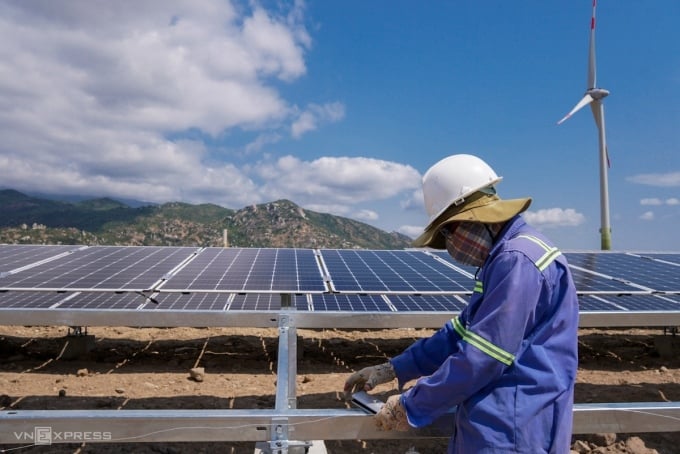
Workers constructing a solar power project in Ninh Thuan, February 2019. Photo: Quynh Tran
In addition, rooftop solar power is also growing rapidly, with 7,864 MW in operation by the end of 2020. This figure brings the total solar power capacity to 16,506 MW, 19 times higher than the approved capacity of the adjusted Power Plan VII. This leads to an increase in the solar power capacity structure by 1.4% to 23.8%.
Some regulations advised and issued by the Ministry of Industry and Trade were assessed by the Government Inspectorate as "leading to loopholes, inadequacies, and risks of policy exploitation" to develop large-capacity rooftop solar power systems on agricultural and forestry land under the farm model. These projects violate planning and land use plans but still enjoy investment incentive mechanisms like rooftop solar power, which means enjoying a price of 8.38 cents per kWh for 20 years.
Solar power exceeds the planning dozens of times, mainly concentrated in the Central and Central Highlands regions with low load, requiring a transmission plan to release capacity, but the power grid is not invested in promptly, leading to an imbalance between the source and the grid. The power system is locally and widely overloaded in some localities such as Ninh Thuan, Binh Thuan, Phu Yen, Gia Lai, Dak Lak... forcing factories to reduce generation, causing difficulties in managing and operating the power system.
"The structure of power sources, regions and the power grid system is unbalanced, causing local overloads leading to capacity cuts, failing to ensure the economic and technical aspects of the power system and disrupting the adjusted Power Plan VII. This wastes social resources and negatively affects the investment environment in the power sector," according to the Government Inspectorate.
According to the inspection agency, all regulations require investment to be based on provincial and national solar power planning, but the Ministry of Industry and Trade has not implemented it. The Ministry has not established a national solar power development plan for 2025, with a vision to 2035, in the right planning period. Nearly 20 months after Decision 11/2017 was implemented (meaning it is only valid for 6.5 months), the Ministry has just established and submitted the above plan to the Prime Minister for approval.
This leads to hundreds of projects approved by the Ministry of Industry and Trade for supplementation (for projects under 50 MW) or advised by the Prime Minister for supplementation (for projects over 50 MW) without legal basis for planning, without basis for management, control and ensuring competition in attracting investment, with the risk of giving and receiving mechanism arising.
For example, of the 114 additional projects, 92 projects (with a total capacity of 3,194 MW) were included separately by the Ministry of Industry and Trade in the Power Development Plan of 23 localities based on the proposals of the People's Committees and investors. However, two-thirds of these localities do not have solar power plans in the provincial Power Development Plan. Therefore, the approval of the above 92 projects is without legal basis, violating Decision 11/2017 on encouraging the development of solar power.
Similarly, 54 projects (with a total capacity of 10,521 MW) were approved by the Ministry of Industry and Trade for the Prime Minister to be added to the adjusted Power Plan VII based on the proposals of the People's Committees of the provinces and investors, even though there is no national solar power development plan until 2020.
According to the conclusion, the Ministry of Industry and Trade had shortcomings and violations when advising on the incentive mechanism for solar power projects in Ninh Thuan after Decision 11/2017 expired, leading to 14 projects enjoying the preferential FIT price of 9.35 cents per kWh for 20 years, which is not in accordance with regulations. The amount of electricity that EVN must pay to these investors in 2.5 years (from 2020 to June 2022) increased by VND 1,481 billion.
When advising on Decision 13/2020 (decision to extend the FIT price incentive policy for solar power), the Ministry also proposed to expand the projects that enjoy preferential prices, meaning that only projects that have been approved for investment policy, do not need to sign a power purchase contract, and are under construction can be purchased at a price of 7.09 cents per kWh for 20 years.
The inspection agency believes that the Ministry of Industry and Trade's proposal to apply the FIT price to grid-connected and rooftop solar power projects of 20 years is too long, unreasonable compared to the investment recovery period, and inconsistent with the roadmap for developing a competitive wholesale electricity market. The electricity purchase and sale price is pegged to the USD corresponding to each commercial operation time, causing many price levels due to exchange rate changes, causing difficulties in implementation.
According to the Government Inspectorate, some recommendations on "not investing in solar power at all costs, needing to be synchronized with investment in transmission and distribution grids and the affordability of end consumers" were made by EVN, but were not fully accepted by the Ministry of Industry and Trade.
The Ministry has also not yet issued regulations on bidding to select investors for power source projects, mechanisms for handling slow-progressing power transmission grid projects, and has been slow to introduce a mechanism for direct electricity purchase and sale from solar and wind power projects after the old policy expired.
The Government Inspectorate recommended that the Prime Minister assign the Ministry of Public Security to receive the dossier for investigation and handling. 123 out of 154 projects approved by the Ministry of Industry and Trade for supplement and advice to the Prime Minister for approval for operation in 2016-2020 are the main causes of imbalance in power sources - grid, power source structure, regions, causing difficulties in managing and operating the power system and wasting social resources. This shows lax management, showing signs of irresponsibility causing serious consequences, according to the Government Inspectorate.
The inspection agency also recommended transferring documents to the police agency to clarify the loopholes in the consultation on the issuance of a mechanism to encourage the development of rooftop solar power, leading to many rapid investment systems with large capacity (nearly 1 MW) on agricultural land, violating planning and land use plans but enjoying preferential mechanisms (FIT price of 8.38 cents per kWh for 20 years). The consultation on some preferential solar power policies of the Ministry of Industry and Trade increased the cost of purchasing electricity and reduced the profits of state-owned enterprises (EVN). Along with that is the management and use of land to invest in the construction of solar power and wind power projects on the land of the National Mineral Reserve Planning, the zoning plan for exploration, exploitation, processing and use of titanium ore in Binh Thuan province.
The Inspectorate also requested the Prime Minister to direct the Ministry of Industry and Trade to review and handle the responsibilities of relevant organizations and individuals for the violations and shortcomings. This agency also forwarded the inspection conclusion to the Central Inspection Committee for consideration and handling according to its authority with cadres under the management of the Politburo and the Secretariat related to the above shortcomings, shortcomings and violations.
With 14 solar power projects in Ninh Thuan enjoying FIT price mechanisms that are not in accordance with regulations, the Government Inspectorate requested the Ministry of Industry and Trade to propose economic solutions and report to the Prime Minister.
The Ministry of Industry and Trade and EVN are requested to review and handle solar and wind power projects that have been recognized as having reached the commercial operation date (COD) and enjoying FIT prices without having received written approval from competent authorities for the results of the investor's construction acceptance. If the review detects violations, they will be transferred to the investigation agency for consideration and handling.
Regarding rooftop solar power systems invested on agricultural and forestry land under the farm model, the inspection agency also requested the Ministry of Industry and Trade, EVN, and provincial power companies to review and handle the application of electricity prices to these projects.
Source link







![[Photo] Prime Minister Pham Minh Chinh chairs a meeting on the implementation of the Lao Cai-Hanoi-Hai Phong railway project.](https://vphoto.vietnam.vn/thumb/1200x675/vietnam/resource/IMAGE/2025/5/20/0fa4c9864f63456ebc0eb504c09c7e26)
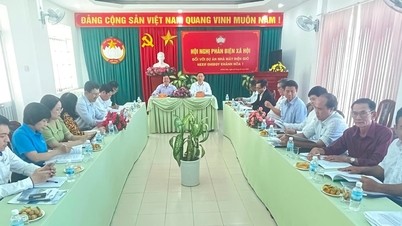







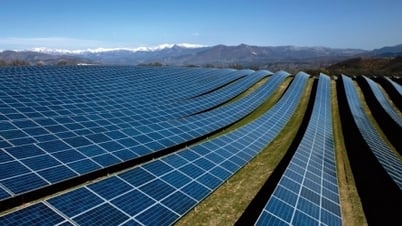

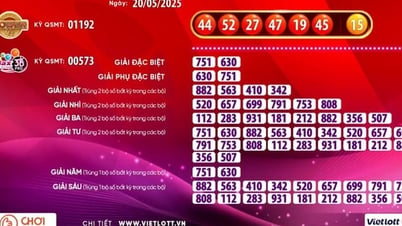





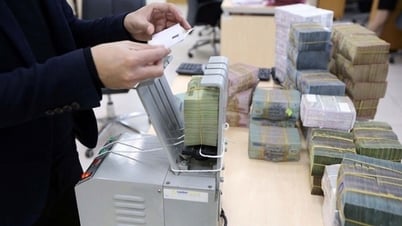

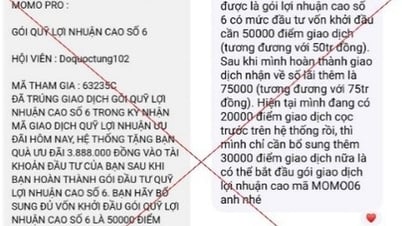








































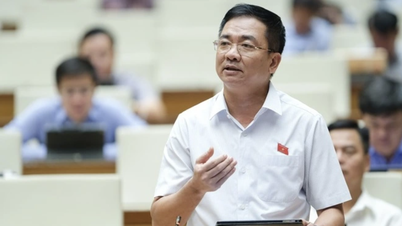




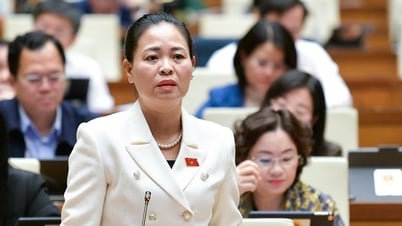














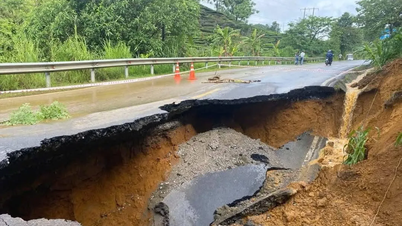


















Comment (0)